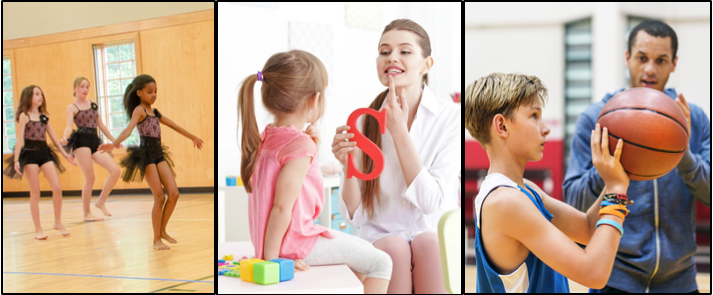Understanding IEP Goals
Kristin Park, MS CCC-SLP A while ago, I wrote a blog post about

Speech and Hearing Health Blog
By: admin | January 10, 2020
The Busy Parent’s Dilemma: Sports or Speech?
Kristin Park, MS CCC-SLP
When you think of after-school activities, what comes to mind?
Basketball… Music lessons… Skiing… Horseback riding… Chess club… Swim lessons… Dance… Gymnastics… Art club… Youth Group… Scouts… Just to name a few.
With so many extracurricular activities to choose from, a child’s after-school hours can be filled nearly year round. There is certainly no shortage of activities to keep children busy and active.
But did Speech Therapy make your list?
Many parents choose after-school activities for their children on the basis that the activity will enrich their childhood experience and help them gain valuable life skills. For children diagnosed with speech and language disorders, speech therapy is designed to do exactly that. After-school, private speech therapy is tailored to the individual child’s needs and ensures they are developing critical communication skills. However, speech therapy often seems to be one of the first activities to be cut when a family’s schedule gets too busy.
It’s true that the benefits of after-school activities are numerous. In an article from the Child Mind Institute, Harry Kimball explains “Sports allow children to demonstrate competency and mastery, which is important for self-esteem and identity development.” The same article quotes Rachel Cortese, a speech-language pathologist and former New York City schoolteacher: “In general, kids tend to do really well when they have structure, and part of that structure is having an after-school schedule. After school activities have also stepped in to supplant the unsupervised “free time” we’re no longer comfortable allowing our children to have.” These structured activities provide consistency, engagement, and social interactions.
Arguably, the benefits of speech therapy are even more essential to a child’s development. Children who are diagnosed with speech and language disorders demonstrate communication delays and difficulties that place them significantly behind their peers. Unaddressed communication disorders can lead to frustration, confidence issues, social anxiety, and poor academic performance. With the appropriate intervention and personalized treatment plan, speech therapy can:
(List from Pam Drennen, MS CCC-SLP of Kidmunicate)
Perhaps one of the most important things to remember about speech therapy is that it is therapy, not just an “activity” to add to the after-school schedule. When a child is diagnosed and qualifies for therapy, it is critical that parents and therapists are in agreement about the best plan of treatment. If parents suspect that their child has an issue with speech or language, they should start with a comprehensive evaluation. If the issue is diagnosed, the speech language pathologist will guide the family to the best treatment for the child. The SLP will 1) set appropriate and achievable goals, 2) outline a plan to achieve those goals, 3) teach the proper techniques, 4) encourage practice at home and 5) build the child’s confidence. Following this treatment plan will help the child gain independence, learn critical communication skills, and decrease frustration and embarrassment.
The takeaway message? When trying to decide which after-school activities to cut from your busy schedule, keep speech therapy as a priority. Take the extra effort to rearrange your schedule, change your child’s weekly therapy time, or find an SLP who can accommodate your needs. Cancelling your child’s therapy to squeeze in a few more hours of basketball or cheer practice is simply not worth it in the long run.
Sources
https://childmind.org/article/finding-the-balance-with-after-school-activities/

Kristin Park, MS CCC-SLP A while ago, I wrote a blog post about
By: admin | January 19, 2022
